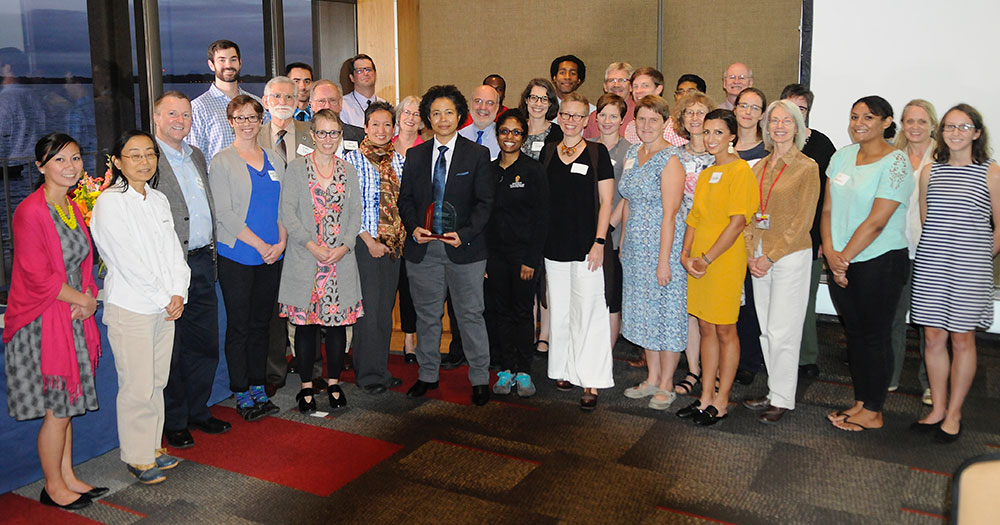
Farley Visiting Professor Renee Crichlow, MD, FAAFP (center, holding plaque) gathers with DFMCH faculty, staff and guests after her resonating lecture on advocacy and adverse childhood experiences.
“Start where you are. Use what you have. Do what you can.”
This quote from tennis legend Arthur Ashe anchored the advocacy message of Renée Crichlow, MD, the UW Department of Family Medicine and Community Health’s (DFMCH) 2018 Eugene Farley Visiting Professor.
Dr. Crichlow, an assistant professor at the University of Minnesota Medical School’s Department of Family Medicine and Community Health, spoke to the DFMCH on September 5, 2018. Her lecture, “Targeted Social Justice: Evidence for Advocacy Addressing ACEs,” focused on strategies to prevent and mitigate health disparities through the lens of adverse childhood experiences (ACEs).
According to the Centers for Disease Control and Prevention, ACEs are linked to risky health behaviors, chronic health conditions, low life potential, and early death (learn more).
Dr. Crichlow explained that the more ACEs an individual has experienced, the higher the risk for these outcomes, adding that negative health outcomes frequently perpetuate through subsequent generations.
Visiting nurse programs for pregnant women and families with newborns are one proven way to prevent ACEs before they happen, she said. Those programs help strengthen parenting practices and ensure a healthy home environment during the first two years of life, when children are most neurally vulnerable.
Early-childhood education interventions, such as Head Start, are another valuable strategy, as they provide social stimulation, support and nurturance critically needed in early childhood.
“Research shows that just one caring, safe, significant relationship with an adult early in life give any child a much better shot at growing up healthy,” Dr. Crichlow said.
Climbing the Ladder
Encouraging attendees to advocate for health and justice at every level possible, she also shared her experiences leading The Ladder, a mentoring group in North Minneapolis for people interested in health careers.
Membership is open to youth as young as fourth grade, all the way to practicing physicians. The program focuses on building leadership from within and empowering members to be guardians of their community’s health.
And although it isn’t necessarily intended to be a family medicine pipeline, it serves as one. Dr. Crichlow said that among University of Minnesota Medical School graduates, 44 percent of students who were members of The Ladder as youth ultimately matched into family medicine residencies.
“There is no problem that human society faces that human society can’t fix,” she said, concluding with a testament to the Farleys’ legacy. “One of the things I really appreciate about them is that they saw the problems and they did something about them.”
More about Dr. Crichlow and the Farley Lecture
Dr. Crichlow’s Farley lecture built on her presentation at the DFMCH’s Statewide Grand Rounds earlier that day.
In “How Does the Social Become the Biological: Evaluating the Social Determinants of Health Inequalities in the Theoretical Context of Complexity and Systems Science (archived here), she spoke about how long-standing inequities in educational attainment, wealth and race/ethnicity correlate with all metrics of chronic disease—and the overall health of a community.
The Farley Visiting Professorship was established in 1993 to honor former DFMCH Chair Eugene Farley, MD, and his wife Linda Farley, MD, a faculty member at the Belleville Clinic.
Its purpose is to stimulate ideas and discussion through visits by candidates whose area of interest is in the humanistic aspects of medicine, medical ethics, social consciousness, philosophy of family medicine, healthcare reform, generalist education or cross-cultural concerns.
Frey Writing Award Winners
At the Farley event, the DFMCH also presented this year’s John Frey Writing Award winners. The Frey Writing Awards were established in 2010 to honor John Frey, III, MD, past chair of the DFMCH, and to recognize and encourage individual creative writing.
Prose:
- Explanations for eating hot soup outside on a hot day (Cassandra Sundaram)
Poetry:
- Dress Code (Ildi Martonffy, MD)
- On Totternhoe Beacon, Summer 2018 (Jennifer Edgoose, MD MPH)
- The Shell (Maggie Larson, DO)
View all of this year’s Frey Writing Award submissions
Published: October 2018
